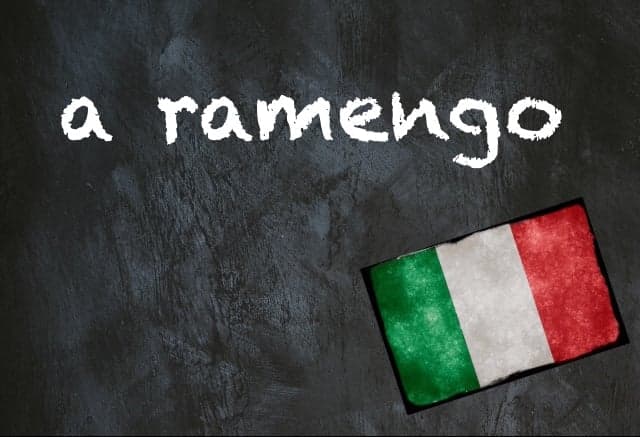Do you have an Italian word you’d like us to feature? If so, please email us with your suggestion.
Italian Word of The Day
Supported by: 

Italian expression of the day: 'A ramengo'

This is one part of Italy you never want to go.
I'd never heard of a ramengo until a reader wrote in to ask what it meant. A quick search revealed two things: 1) Aramengo is a small town in Piedmont, and 2) no one seems to want to go there.
I should clarify that Aramengo looks perfectly charming. But what my Googling turned up was that the phrase andare a ramengo ('to go to ramengo') means 'to go to ruin', 'to fall apart', 'to go pear-shaped'.
Questa missione è andata decisamente a ramengo.
This mission has gone decidedly pear-shaped.
Why should poor old Aramengo be associated with rack and ruin?
The most prevalent theory seems to be that back in the days when Piedmont was ruled by Lombard dukes, those convicted of crimes – especially failing to pay back their debts – would be exiled to the far reaches of the realm, which in the Middle Ages lay... right around Aramengo. Thus the town, the story goes, became a synonym for bankruptcy.
All that could be an urban legend: others say ramengo actually comes from the verb ramingare, 'to wander' or 'to roam'.
Andare ramingo is a somewhat literary way of saying 'to go roving' and linguists believe ramengo is simply the Venetian dialect version, a variant that has come to mean, by extension, to go off course or awry, to find yourself an exile or vagabond.
Our reader confirms that her grandparents spoke Venetian, while a Milanese friend of mine tells me the expression is used all over the north.
As well as a description, you can also use the phrase as a command: it's a kind of curse when you want to wish someone trouble.
Va’ a ramengo e non mi seccare!
Go to hell and stop bothering me!
May you never go to ramengo – but I hear Aramengo's lovely this time of year.
 Lovely Aramengo. Photo: Gianluigi Faletti - CC BY-SA 4.0, Wikimedia
Lovely Aramengo. Photo: Gianluigi Faletti - CC BY-SA 4.0, Wikimedia
Comments (1)
See Also
I'd never heard of a ramengo until a reader wrote in to ask what it meant. A quick search revealed two things: 1) Aramengo is a small town in Piedmont, and 2) no one seems to want to go there.
I should clarify that Aramengo looks perfectly charming. But what my Googling turned up was that the phrase andare a ramengo ('to go to ramengo') means 'to go to ruin', 'to fall apart', 'to go pear-shaped'.
Questa missione è andata decisamente a ramengo.
This mission has gone decidedly pear-shaped.
Why should poor old Aramengo be associated with rack and ruin?
The most prevalent theory seems to be that back in the days when Piedmont was ruled by Lombard dukes, those convicted of crimes – especially failing to pay back their debts – would be exiled to the far reaches of the realm, which in the Middle Ages lay... right around Aramengo. Thus the town, the story goes, became a synonym for bankruptcy.
All that could be an urban legend: others say ramengo actually comes from the verb ramingare, 'to wander' or 'to roam'.
Andare ramingo is a somewhat literary way of saying 'to go roving' and linguists believe ramengo is simply the Venetian dialect version, a variant that has come to mean, by extension, to go off course or awry, to find yourself an exile or vagabond.
Our reader confirms that her grandparents spoke Venetian, while a Milanese friend of mine tells me the expression is used all over the north.
As well as a description, you can also use the phrase as a command: it's a kind of curse when you want to wish someone trouble.
Va’ a ramengo e non mi seccare!
Go to hell and stop bothering me!
May you never go to ramengo – but I hear Aramengo's lovely this time of year.
Lovely Aramengo. Photo: Gianluigi Faletti - CC BY-SA 4.0, Wikimedia
Join the conversation in our comments section below. Share your own views and experience and if you have a question or suggestion for our journalists then email us at [email protected].
Please keep comments civil, constructive and on topic – and make sure to read our terms of use before getting involved.
Please log in here to leave a comment.